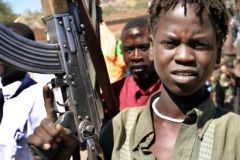Darfur rebels roam empty African plains
By Opheera McDoom
JABEL MOUN, Sudan, Feb 9 (Reuters) – Mohamed Abdel Karim crouches down on the sandy earth next to a rifle bigger than his tiny frame, lights up a cigarette and nurses a stick cast protecting his broken right arm.

|
|
A young Sudan Liberation Army (SLA) rebel marches through the mountain village of Deribat in South Darfur state in western Sudan November 16, 2004. (Reuters). |
The 12-year-old is one of many child soldiers caught up in fighting during the rebellion in Darfur, which has claimed tens of thousands of lives and forced more than 1.8 million people from their homes in the arid region the size of France since it began in February 2003.
Sheltering from the sweltering heat of the Savannah plains surrounding West Darfur’s Jabel Moun area, he proudly states he is fighting for the freedom of his people, sporting the traditional light green head wrap which runs the entire length of his small body.
“My mother and father would be happy because I will free Darfur from tyranny,” he said. His family are across the border in Chad in a refugee camp, having fled fighting last year.
He joined the rebels 11 months ago when his two brothers also joined. Mohamed carries a pistol — he’s not graduated to carrying Kalashnikovs like his older comrades.
Jabel Moun, about four and a half hours off-road driving through burned villages, desolate desert and African plains from the Chadian-Sudanese border town of Tine, is the stronghold of a breakaway rebel group, the National Movement for Reform and Development (NMRD).
The NMRD is a little-known group which split from the rebel Justice and Equality Movement (JEM) last April. Fighters said they command between 2,000 and 5,000 troops, mostly along the border with Chad and around the Jabel Moun area.
They move camps and stay as mobile as possible in clapped out old vehicles they stole from the government during attacks or in newer 4x4s, which they say were donated to them by rich supporters outside the country. Leader Gibril Abdel Karim Bari’s vehicle had no windscreen left.
Gibril is the commander the militias say they most want and the rebels from NMRD most respect. An accomplished military mind, his driving skills are famously lacking. A crashed car wrapped around a smashed tree next to the track was testament to his latest accident.
“Oops, sorry,” he said, laughing as he drove at breakneck speed into a ditch, with dozens of soldiers hanging off the back, clinging on for dear life.
The rebel soldiers roam throughout the rough, thorny terrain, empty for hundreds of kilometres but for the odd hawk or pea hen. Most of the inhabitants fled the fighting and are among the more than 200,000 refugees encamped in Chad. Many villages were burned.
Rebels often come under attack from Arab militias, known as Janjaweed. But they say the government has not bombed for about six months in their area.
REBEL FAMILIES
Despite the splits in Darfur’s rebel movements and the external political leadership’s differences, the lines between the rebel groups on the ground are faint. Many joined the NMRD from JEM or the other group, the Sudan Liberation Army (SLA).
One of Mohamed Abdel Karim’s brothers is in JEM, and the other in the SLA. He regularly touches base by telephone. Abdel Gasim is the general secretary of the NRMD and his uncle is the JEM spokesman in London.
“We are all fighting for the same reasons — why would we not coordinate?” said Khalil Abdallah, the political secretary of the movement.
Gibril said his forces in South Darfur took orders from the SLA commander there and the SLA base near Jabel Moun answered to him.
The NMRD move freely back and forth across the Chadian border, where they sporadically signal to groups of armed men to let them pass.
“The roads there are safer — on the Sudan side there are Janjaweed,” said one driver, who identified himself as Ahmed.
But they deny any formal links or support to the Chadian government, who is mediating their talks with the government.
